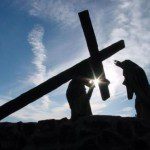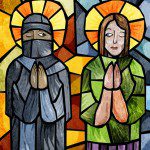I had a fascinating phone conversation with Tullian Tchividjian a few weeks ago. I could not publish it immediately, since I was in the midst of the Jeremy Lin project, but I want to publish it now in installments. Tullian, a grandson of Billy Graham, is pastor of the very prominent (founded by D. James Kennedy) Coral Ridge Presbyterian Church in Fort Lauderdale, Florida, a contributing editor to Leadership Journal, and author of books like Unfashionable and Surprised by Grace. His latest book, Jesus + Nothing = Everything, sounds fantastic.
I experienced, when I broke my neck, the truth Tullian expresses with such mathematical rigor in the title. Informed my neck was broken, I was overcome with a strange but undeniable elation at the realization that none of it mattered. Many of the things I had fought for, things the world cares for very deeply, were being stripped away from me. But I realized I needed nothing but Jesus Christ. Tullian actually cites the very verse that came to summarize this for me: Paul’s words in Philippians 1 that “For me, to live is Christ and to die is gain.”
Enjoy Part 1 of the interview, on the backstory to the book, and how the central realization of the book shaped his leadership and ministry:
* * *
What’s the backstory to your latest book? What do you mean by the title Jesus + Nothing = Everything, and how did you come to this realization.
I was theologically and biblically trained to understand that the gospel was necessary not only for non-Christians but also for Christians. Once God saves us, he does not move us beyond the gospel but more deeply into the gospel. I understood that cognitively.
 It really hit home for me functionally in the summer of 2009, for two reasons. My father was sick and slowly dying at the exact same time that the church I had planted five years earlier was merging with Coral Ridge Presbyterian Church. We had anticipated difficulty, fireworks, resistance, but we didn’t know exactly what form that would take or how intense it would get.
It really hit home for me functionally in the summer of 2009, for two reasons. My father was sick and slowly dying at the exact same time that the church I had planted five years earlier was merging with Coral Ridge Presbyterian Church. We had anticipated difficulty, fireworks, resistance, but we didn’t know exactly what form that would take or how intense it would get.
In the summer of 2009, the strain was really, really intense. I was being attacked and maligned and threatened. It was a terrible time for me and our family and our church. Over night, I had become the father of a blended family. When you try to merge anything, a family, business or a church, you can expect difficulty — but I had not expected to be personally attacked in the way I was.
Then, that summer, when everything was at its worst, I went on vacation with my family. On the first morning I woke up early, and I hadn’t been sleeping or eating. I’m not naturally prone toward depression and despair. I’m an extrovert. I love life. But I was in the pit of despair, and reading Colossians 1, and really had it out with God. I let it all boil over and basically demanded an explanation for why God had ruined my life. It was through Colossians 1, in a time of absolute desperation, that I discovered that I wanted my old idols back (not just my old life) — and God loved me too much to give them to me.
The specific idol I had been clinging to — though I didn’t realize it until then — was the idol of approval and acceptance. I was working through Colossians 1, and what it meant for me on the ground of life is that all the acceptance and approval and affection that you’re seeking in other people you already possess in Christ.
Your deepest longing for approval and acceptance has already been met in Christ — that set me free in a way that changed me forever. It was at that point that “Jesus + Nothing = Everything” ceased being merely a theological commitment. It became my functional lifeline. So, while I never want to go through that experience again, I wouldn’t trade it for anything in the world because it was during that time that God taught me the explosive power of the gospel’s relevance for me now. As I put it in the book, I discovered the “now-power” of the Gospel. The gospel doesn’t just save us from the past. The gospel transforms everything in my life now, today, and tomorrow.
So that’s really the back-story of the book, and it was while I was sitting on my balcony overlooking the Gulf of Mexico in the condo we were renting that I realized, in a brand new, fresh and liberating way, just how necessary the gospel is for everyday life.
How did this realization shape your life as a pastor and leader in the church?
When you realize that you already possess everything you need in Christ, you recognize that you don’t actually need anything from anybody. Everything you need, you already have in Christ — you don’t need anything more, so now you can now spend your life giving yourself away. That invests your life as a leader with unbounded courage.
Now, I can walk into a meeting to announce an important decision and not be worried that some in the room might not like it, and fight against it. I can live my life with unfettered sacrifice because I don’t need to win. I’m free to lose, and that’s something leaders face all the time. So much of their own sense of value and worth and identity is wrapped up in success as the world defines it.
But when you realize that because Jesus won for me, I’m free to lose, because Jesus succeeded for me I’m free to fail, that makes you a powerful leader. You can live your life with reckless abandon, realizing on the one hand that, like Paul said, to live is Christ and to die is gain. Everything I need I already have. There is nothing anyone can strip away from me that I actually need. I’m free to be unpopular, free to make tough decisions, free to stand on principle and do what’s right even if people will resist it.
It changed me as a leader. I have more courage. I’m able to lead more boldly. I’m able to lose and not have to walk out of a meeting getting my way. I can be sacrificial. I can give myself away, because all I need is Christ. I don’t need anything else. I’m now free to give everything I have without needing anything in return. I can love those who hate me, I can turn the other cheek when I’m slapped in the face, because my dignity and my sense of value is not wrapped up in what I have in this person or this project. It’s wrapped up in Jesus.
That changes everything.
* * *
Come back Thursday for Part 2 of the Interview.















